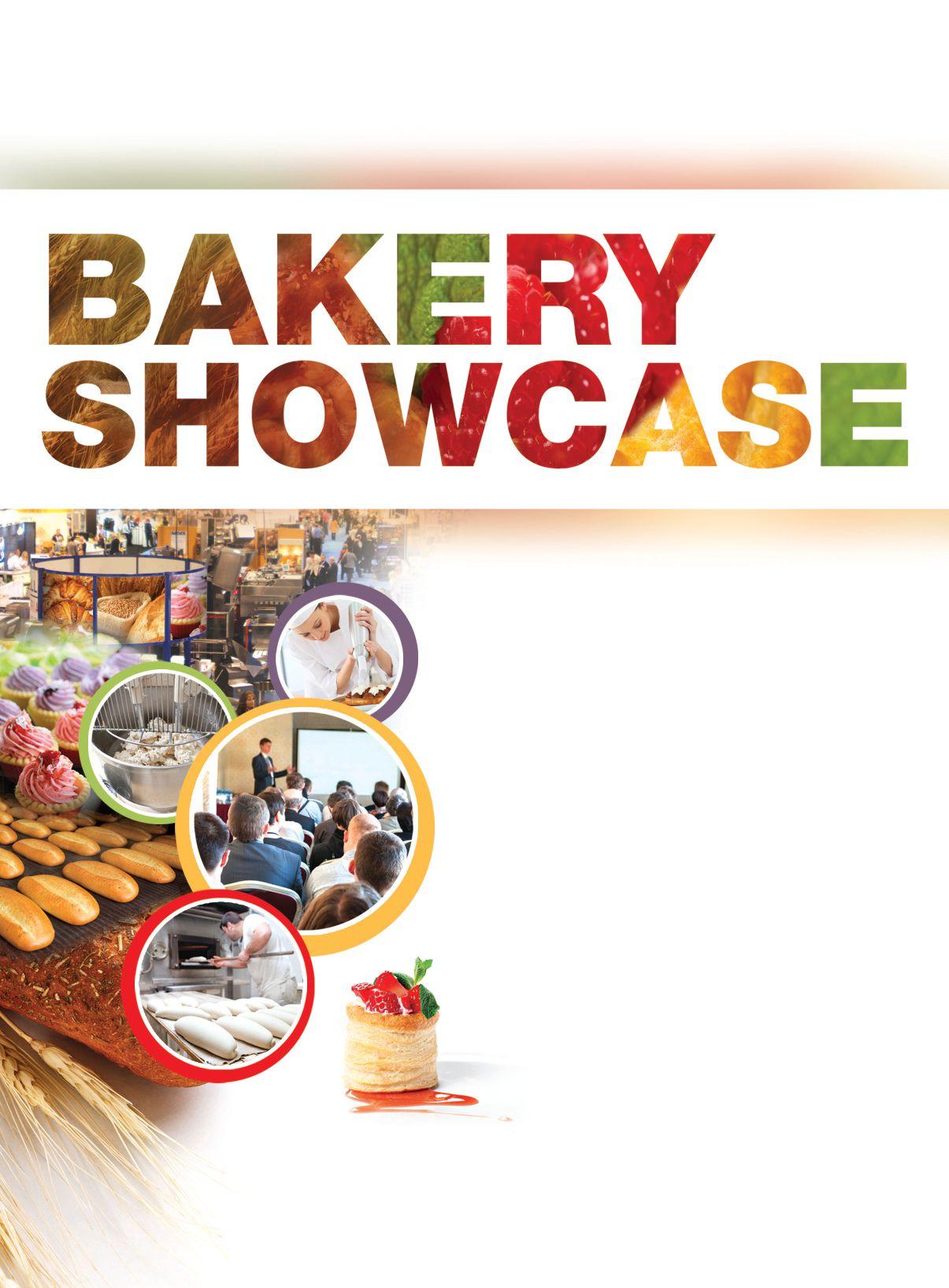

BAKERY SHOWCASE
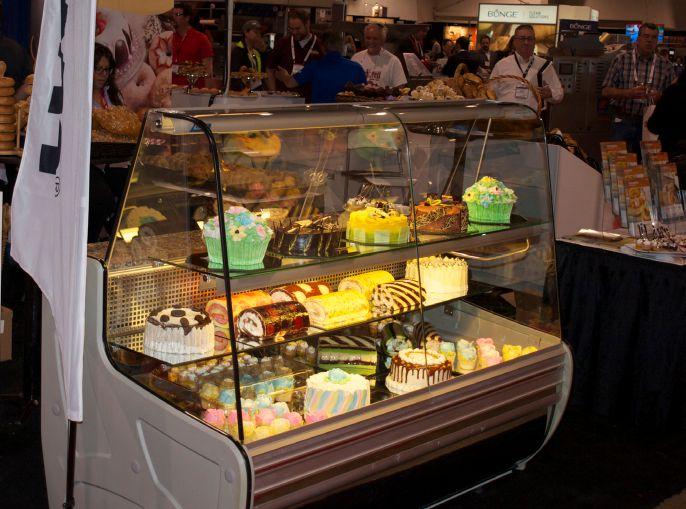
With a spirit of renewal in the air, attendees flocked to this spring’s Bakery Showcase in early May to soak up the product demonstrations and take advantage of the many learning opportunities available.
Hosted by the Baking Association of Canada (BAC), this year’s three-day event held May 1 to 3 at the International Centre in Mississauga, enjoyed attendance of over 4,000, matching the numbers attracted to the biannual show in 2014.
In a sit-down chat with Bakers Journal following the event, BAC president Paul Hetherington expressed his pleasure with the show. “You always like to grow, but we didn’t have a decline in attendance which is a positive, but one of the things we found really interesting this year was the traffic pattern. Historically, over the three days of the show Sunday was the busiest, Monday a bit slower and Tuesday generally is the
least busy. In 2014 Sunday and Monday were almost even in attendance, with a drop off on the Tuesday. This year, more than 50 per cent of the attendance came on the Monday.”
Why the change? He speculates that it could be because of changing retail business practices, with shops being open Saturday and Sunday, or perhaps people are deciding to keep Sunday as their day off. “That’s something we’re going to be looking at to ascertain if that’s going to become a long-term trend.”
With respect to show size and the number of exhibitors, the event was down this year. Hetherington explained how every eight years Bakery Showcase is sandwiched between two international events: the IBA in Munich, Germany, (September 2015) and the IBIE event in Las Vegas (October 2016). “When we look back at our records, our event was the same size as it was back in 2008 when we last had this confluence of events,” he says. “We
recognized that was going to be a challenge, but we maintained our ground, even though we continue to have more consolidation in the industry. So we are pleased with that.”
To keep the event attractive and informative, the association stepped up its educational program this year. “We have historically provided some form of educational programming, but starting at the Bakery Congress in Montreal last year we began putting more investment into a paid speaker program, with a separate registration and investing in bringing in quality speakers to address issues of the day. My personal belief is we delivered on that, and the feedback we’ve received from those who participated was positive.”
Along with the learning sessions scheduled each day prior to the show opening, on the show floor the BAC hosted the Knowledge Center in partnership with Ardent Mills, and with the Healthy Grains Institute involved. “The effort behind that was simply to help industry understand what the opportunities are with different grains. That’s the type of information transfer we’re trying to achieve,” says Hetherington, who adds that going forward they will be looking at how to generate more dynamic activities on the floor.
Also attracting attention at this year’s event was a cake decorating demonstration featuring professors and students from Algonquin College’s baking and pastry program.
Aside from the educational elements, the BAC is broadening its horizons to deliver innovative production and product ideas to the event through an international outreach. “We had two foreign delegations come through this year — one from China and one from the Middle East,” Hetherington says. “We also had about 14 delegates come from various trade consulates. We’re trying to spur on interest with those consulates to work with us to bring in products and services from other countries that would give attendees something new and exciting.”
Dawn Food Products displayed colourful cakes and sweets along with a collection of artisaninspired breads and more.
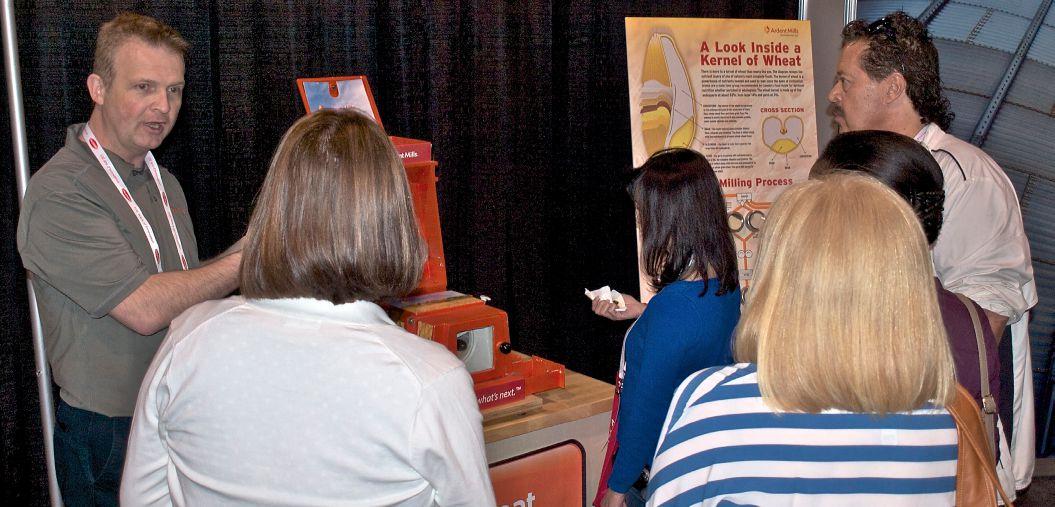
In the Knowledge Centre representatives from Ardent Mills were demonstrating the milling process on a mini-mill, specially fabricated to safely reveal the inner workings of the milling process. Visitors were also exposed to the anatomy of wheat and saw different grains as well.
For the BAC, entertaining new ideas and programming for the show is part of its continuous learning and its goal of transferring information, both local and international, to the Canadian industry.
ON THE SHOW FLOOR
Attendees at Bakery Showcase witnessed a wide variety of machinery from ovens, mixers and dough dividers to labeling and packaging solutions. And the ingredient companies also had a lot to show and share. The following is a sample of what we saw:
• Holding firm: Lallemand Yeast Group’s Michel Dion showed us a demonstration of the company’s FlexFirm proof-tolerant yeast that allows for extended proof times. Doughs can be held in ambient temperatures for eight hours after proofing and hold their form.
• Refreshing day olds: Dawn Food Products showed practical solutions, like using a waffle maker to repurpose day-old donuts or turning day-old cake donuts into cake-pops.
• Gluten-free flour substitute: Dealers Ingredients highlighted its Profi Bake high protein, high fiber composite powder that performs as a functional replacement for wheat flour in baking applications.
• Clean sprouts: Everspring Farms, supplier of sprouted grains, has upped its sanitation game with enhanced microbial reduction,
adding to its existing BRC certified food safety plan.
• Organic able: Ardent Mills promoted its organic milling capabilities, and as a partner in the Knowledge Centre was giving flour milling demonstrations and lessons on different grain types.
• Chocolate rocks: Callebaut introduced ChocRocks: small glossy, irregular shaped chocolate bits to add to the presentation and texture of sweet treats.
• Colour coding: Chicago Metallic showed its non-stick DuraShield pans with coloured coatings so bakeries can easily segregate their production, and highlighted its StayFlat sheet pans with sidewalls that prevent bowing over time.
• Time-saving ferments: AB Mauri showed its Aromaferm cereal ferments that allow bakers to produce breads with taste and texture of long fermenting sourdoughs and achieve the longer shelf life consumers desire.
• All in the family: ADM Milling, the wheat processing division of Archer Daniels Midland, shared its space with company affiliates like Golden Peanut, which showed its peanut flour — including organic versions suitable for baked goods.
• Playing flavours: McCormick Canada took a twist on its flavour
forecast for 2016 by incorporating pulse proteins and tropical Asian flavours into treats including a Malaysian Rendang curry coconut macaroon, Rendang curry kettle chips, and a lentil and chickpea muffin.
• Pizza for everyone: LC Bakery Equipment attracted crowds to its central location on the show floor by demonstrating its customizable revolving and deck ovens, baking a series of breads and pizza offerings for attendees.
• That’s one huge panatone: Lesaffre Yeast announced its new certified organic Red Star Organic Block Yeast, the first organic fresh yeast produced in North America. Also at its booth was a massive panatone baked from a 22-pound dough.
• Detector protector: targeting bakery production, Fortress Technology of Toronto showed its Interceptor metal detector featuring a highly modular design.
WHERE ARE WE GOING?
Among the learning sessions held before the show was a panel of bakers who provided insights into what shops are facing today. Entitled “Where are we and where are we going: the bakers perspectives,” the panelists included: Dufflet Rosenberg, founder of Dufflet Pastries; Simon Blackwell, owner of Blackbird Baking Co.;
Gottfried Boehringer, president of The Stonemill Bakehouse; and Darryl Rowe, president of Weston Bakeries.
On the topic of consumer perceptions about baked goods, Rosenberg said people talk about clean label, but consumers don’t know what “natural” means.
Rowe agreed. “Consumers are more informed, but not better informed,” he said. “All of us are on a journey to find what consumers want today and tomorrow.”
For Boehringer it was about delivering a “good for you” story that consumers can understand and relate to.
When asked about discerning fads from trends, Rosenberg said it’s the public that decides what will be a fad or a trend. And while Boehringer noted we will always have cycles, Rosenberg said the media is charging up trends today, and social media makes it more explosive than it ever was. She noted how cupcake shops popped up and then faded away. “Is the French macaron here to stay?” she asked, then answered, “I think it is here to stay.”
When it comes to social media, two of the panelists said they are very involved. “I think social is very important,” said
Blackwell, listing Instagram, Twitter and now SnapChat as key channels. His bakery has close to 17,000 Instagram followers.
Dufflet is also active on Twitter and Instagram. “To keep your followers you have to be part of the community,” Rosenberg said. “It’s not just an advertising tool.”
Both Boehringer and Rowe indicated they were not too active on social platforms.
Playing off the social media theme, panelists were asked about how they deal with millennials as customers. “This is why social media is so important,” said Rosenberg, “and online ordering too.”
Boehringer explained the importance of transparency. “Your company’s core values must resonate with their core values,” he said, citing the importance of focusing on the triple bottom line: social, economic and environmental.
For Weston, Rowe said portability and convenience were important, while also maintaining a more natural product. “Being less packaged is viewed as more natural, but is it safe?” he said. “Over time we have to deal with food safety.”


Finally, the panelists were asked about the next trends. For Blackwell the answer was not an item, but a back-to-basics approach. And that sentiment was echoed by Boehringer, who pointed to the move towards long fermentation for breads as opposed to industrialized loaves.
Rosenberg couldn’t identify one trend, but said she’d like to get away from bright colours and having to create perfect gems for people to take photos of for Instagram.
And according to Rowe, transparency and portability are the new trends.
Transparency so customers can understand what’s going into products, and portability because people are snacking more.
The trends pointed out by the bakers were all visible on the Bakery Showcase show floor, where the eye-catching decorative items, quick snack ideas and the promotion of clean label and natural ingredients continue to hold strong.
It will be interesting to see how these trends hold up for the next Showcase in 2018. In the meantime, mark your calendar for the next Bakery Congress set to be held at the Vancouver Convention Centre, April 23 and 24, 2017. / BJ


FROM THE FLOOR

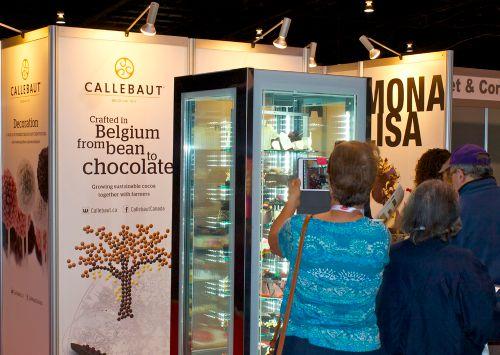
Drawing inspiration from exhibitor displays, here an attendee was taking photos of the chocolate delights at the Callebaut booth.

Fortress Technology of Toronto demonstrated its modular Interceptor metal detector, suitable for food processing production lines.
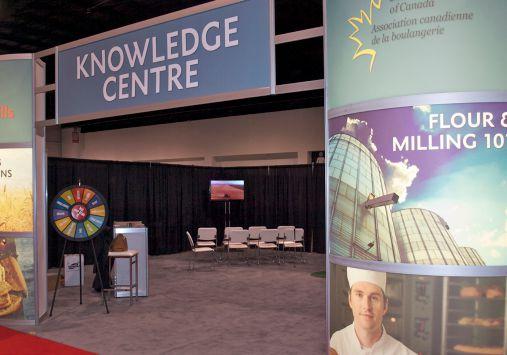
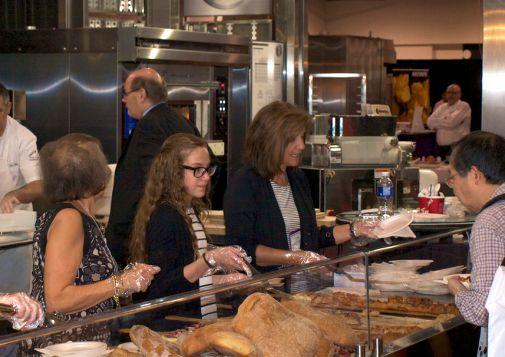
The centrally-located LC Bakery Equipment exhibit was handing out samples of bread and pizza baked in its operating ovens.
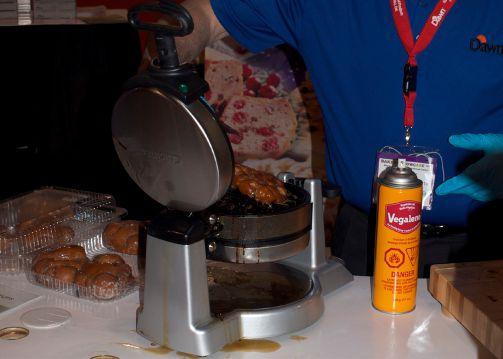
Demonstrating practical solutions for bakeries, Dawn Products was giving new life to day-old donuts with a
waffle iron.
Ardent Mills had a walking wheat grain named “Ardy”, pictured here in the Knowledge Centre—an area focused on edu-tainment including games and demonstrations to teach visitors about grains and health facts.
New in 2016, the Knowledge Centre was sponsored, executed and staffed by Ardent Mills with support from the Healthy Grains Institute.
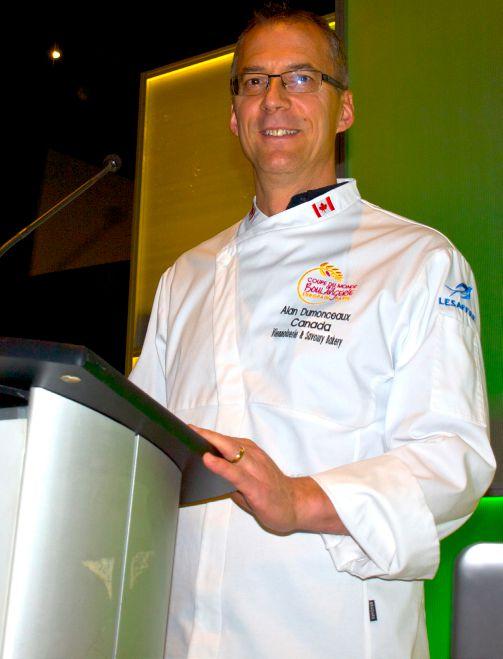
Alan Dumonceaux, Chair of Baking at NAIT and volunteer manager of Baking Team Canada, shared the history and exploits of the Team’s journey from 2004 to the 2016 World Cup in Paris this past February.

“All of us are on a journey to find what consumers want today and tomorrow,” said Darryl Rowe, president of Weston Bakeries, during a panel session: “Where are we and where are we going?”
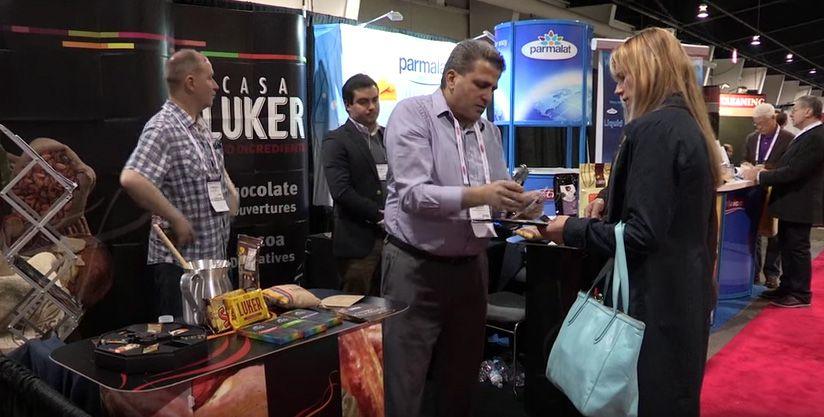

Click on this link to experience some live footage from the floor of Bakery Showcase 2016 https://youtu.be/SgjdmJkASvU
THE PIKANIK APPEAL
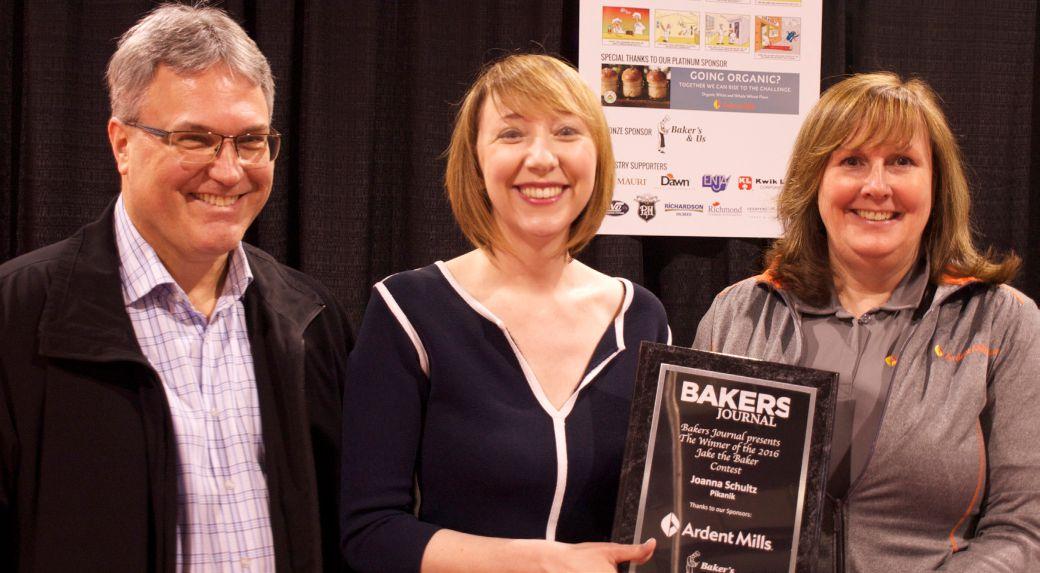
Upon first meeting, Joanna Schultz’s high-energy and fun-loving nature is infectious, but when the discussion turns to business, her focus is serious and it becomes clear she’s relentless in achieving her goals.
Since launching her niche allergen-free bakery, Pikanik, less than four years ago in White Rock, B.C., Schultz has made it her mission to serve the under-served and make her products accessible to everyone. In the past year she has landed Pikanik products and mixes in grocery stores, opened an online store and she’s now exploring the prospect of franchising. The Pikanik phenomenon is growing, and it’s that innovative drive that has earned Schultz the nod as winner of the Bakers Journal Jake the Baker award, sponsored by
Ardent Mills and Baker’s & Us.
A runner up last year, Pikanik stepped up in 2016 and impressed the judges with its continual commitment to product innovation, marketing reach, operations improvements and community involvement. As winner, Schultz received an all-expenses paid trip to Toronto for Bakery Showcase 2016, where she received a plaque to commemorate the achievement.
THE BEGINNING
Growing up in Vancouver, Schultz’s introduction to the baking trade began in a high school culinary arts program. During and after high school she worked in food services and catering, eventually spending time at a small family-run artisan bakery. But she found the tasks a physical grind, and heeding her father’s advice to pursue a job with benefits and a pension plan,
Schultz transitioned to the corporate world, ultimately landing in a labour relations environment.
“I’ve always had a passion for advocacy, and that was something that drew me to labour relations,” she says. It’s that same core instinct to champion a cause that actually led her back to the baking industry.
Schultz always baked at home for pleasure, but when her three-year-old daughter was diagnosed with allergies to gluten and dairy, she made it her mission to begin exploring new ways to bake.
“I was horrified with the gluten-free items available in stores,” she recalls. “I would buy all different kinds of breads, get home, try one bite and that $8 loaf would go in the garbage.”
Schultz ended up asking herself: “Is this as good as it gets?” From that moment she began researching alternative flours and
The 2016 Jake the Baker award was presented to Joanna Schultz, founder of Pikanik, on the show floor at Bakery Showcase. The award was delivered by Elaine O’Doherty of Ardent Mills (right) the award’s platinum plus sponsor, and Ron Letourneaux of silver sponsor Baker’s & Us.
the principles of gluten-free baking.
“The first couple months were pretty bad, so I thought, maybe this is as good as it gets,” she says. “But once I got some formulas figured out things really started to improve.”
She began baking at home a lot, and people in her office kept telling her that she should start selling her goods. “Well, you hear something enough times and you think, hmmm,” she says with a laugh.
A self-described risk taker, Schultz
decided to go for it. The Pikanik name originated from an idea she first had for supplying allergen-free lunches for kids. The meal kits would be like a picnic. It was from there that the allergen-free bakery plan evolved.
All of Pikanik’s products are free of gluten, wheat, peanut, tree nut, dairy and soy, and about 75 per cent are also egg-free.
Part of Schultz’s vision is to create a sanctuary where kids and families with multiple allergies or special diets can
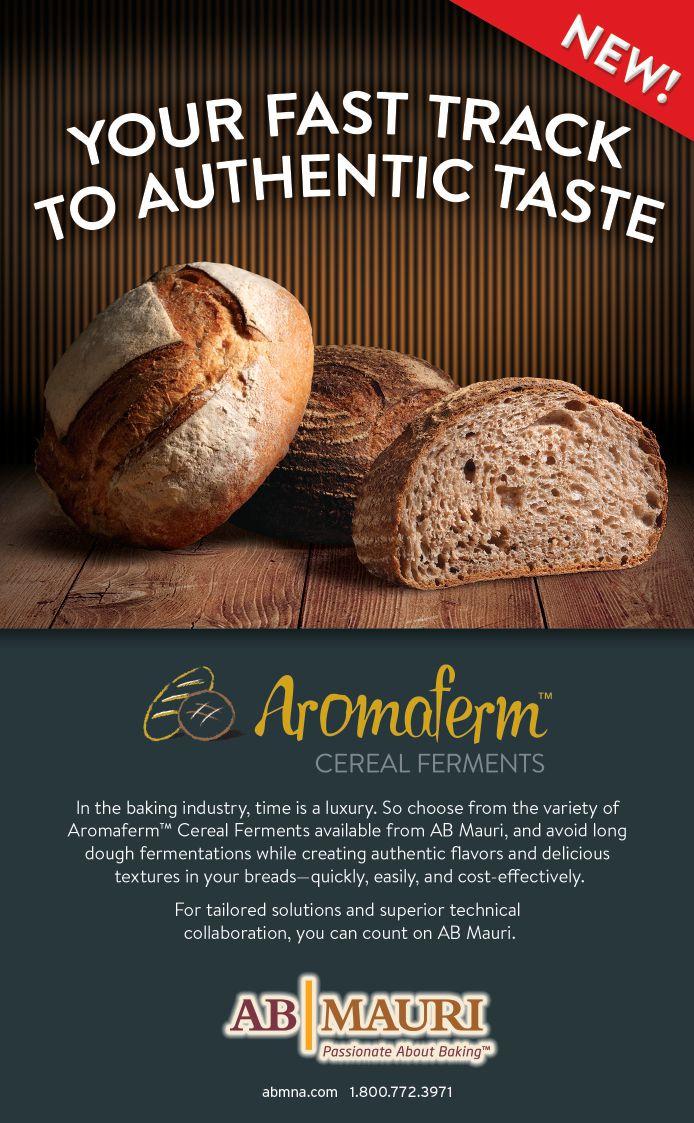
indulge without sacrifice. “I felt absolutely compelled to do it. It didn’t even feel like a choice, it felt like it was the right thing to do,” she says.
At the outset her business plan was modest — it would be a small storefront and she would do all of the baking herself. When she opened the shop in 2012 her youngest of two daughters was only two years old. She was back to the grind, but this time with a purpose.
In the early days it was more about trial and error and seeing where things would lead, she recalls. And then demand took off, and her newfound passion for business development began to flourish.
GROWING THE BUSINESS
“We’ve gone from very small production, baking five days a week, to becoming a busy storefront with a retail line carried in grocery stores — that includes five dry mixes and four frozen products. We also do food service, supplying buns and breads for restaurants, and we’ve been approached by a restaurant chain to develop a gluten-free dessert for its menu.”
Pikanik now employs up to five staff, including a culinary director, who recently became a business partner, along with two part-time bakers and counter staff.
The rapid growth of the business hasn’t been without its share of challenges. As Schultz explains, removing gluten — which is critical in terms of getting the required stretch, texture and consistent structure in baked goods — required a lot of research. “Because gluten is a protein, what a lot of gluten-free bakeries do is add more dairy products, but I can’t do that,” she says. “So the trick is to find ways to combine various flours and starches to maximize proteins so that I can still achieve a consistent chew, texture, moisture and structure.”
Product innovation aside, another huge challenge is sourcing the allergen-free ingredients she requires. “It’s a tremendous amount of work, and we’re really limited,” Schultz says. “There’s literally one margarine that we can use, and we cannot buy it in bulk — retail sizes only.” And it’s similar with chocolate chips, where she’s found only two sources.
“We have customers who have life-threatening allergies. So I take zero chances,” she says. Pikanik will not use products that are manufactured in facilities where any of the allergens are handled. When she engages a new supplier she’ll go through its allergen lists, supplier checklists and plant manufac-
turing information. She will even tour plants to inspect how they separate items and their cleaning procedures.
Yet despite the challenges, the effort is worth it when Schultz considers what she has created. She acknowledges that the ongoing gluten-free food trend has worked in her favour, but that was never her core audience. “I think that for people who aren’t just choosing a gluten-free lifestyle, but who for medical reasons have to be gluten-free, they’re relieved that there is somewhere they can feel really safe.”
She’s witnessed the excitement in kids who have never been able to walk into a bakery before. “I remember going to the bakery as a kid, and I can remember very clearly choosing an R2D2 Star Wars cookie and thinking that was the best day ever. It’s just a rite of passage. It’s a shared experience that most of us get to have, and yet there are some people who don’t get to have it. To me, there’s no reason for that.”
Having achieved so much already, Schultz is now passionate about expanding. “I am an entrepreneur, and business development is something I love,” she says. Pikanik has been growing every year beyond her expectations. It’s not only sales that are growing; by innovating with improved systems and better production processes, she’s also realizing increased profitability.
Pikanik’s products are expensive relative to a conventional bakery, but Schultz points out any bakery that’s doing everything by hand and has high ingredient costs has to charge more. “Our margins are not huge,” she admits. “We rely on volume more than anything in order to be profitable.”
To grow the scale of the operation, Pikanik has launched an online store and delivery service, and in an effort to build loyalty and extend its reach, the company recently started a Share the Love referral incentive program. It also expects to launch a membership-based VIP home delivery service later this year. Both programs can track data to help Pikanik get to know its customers better and enable more targeted offers.
The company is also sharing and engaging with the public through social media, and it’s tapped into influencer marketing by connecting with a local food blogger.
Gaining additional exposure, Schultz appeared in a documentary-style commercial for Secret Deodorant. “That was really
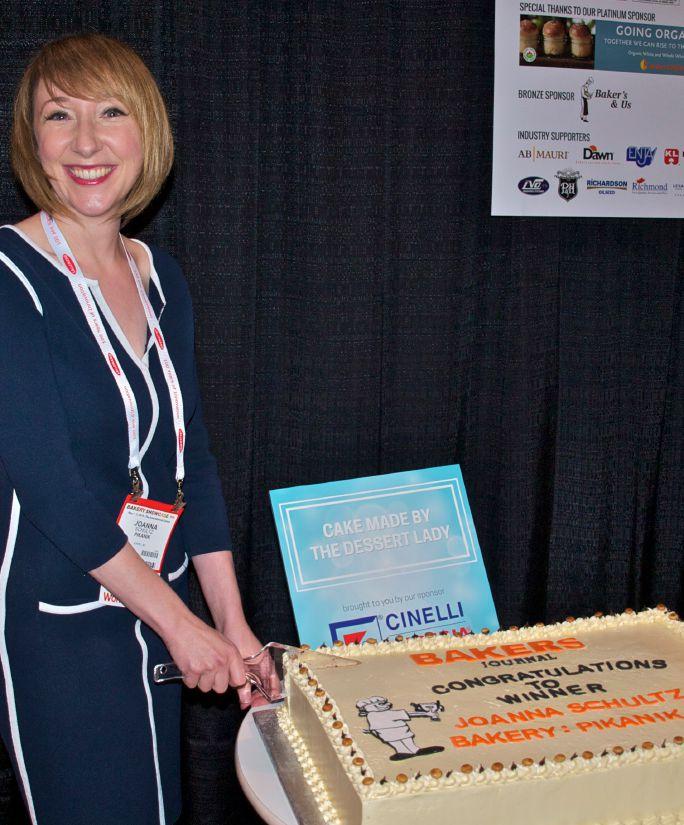
cool: to see my life encapsulated in one-and-a-half minutes,” she says. The video has almost 3 million views on YouTube and has been on cable TV.
Selling online and getting into grocery stores has helped make the products more accessible, but Schultz believes having more storefronts is a great way to expand that safe-haven bakery experience.
She has engaged a franchising expert to explore that avenue. “I don’t want a lot of stores. I’d be happy with one or two more locations in the short term,” she says.
“My biggest fear is the constant vigilance required to ensure franchisees are maintaining the standard. We’ve developed a model that will address those concerns, but it’s all about finding the right people to open the franchises, and then the ongoing relationship and support they would need.”
Although her attention has drifted towards growing the business, she’s still very involved in product development.
“I can’t turn my brain off, so I’m constantly thinking of new ideas for products.” One particular product that has won a lot of traffic is Pikanik’s honey sandwich bread.
“It’s the kind of bread that people try and say, ‘Oh my God, I can’t believe how good this is,’ ” she says. “We sell out of it every single day, and we make more of it all the time to keep up with demand.”
Customers were asking for an egg-free loaf, but with gluten and dairy already removed the eggs are important for protein and structure. Schultz says she had an epiphany one day while driving, and that night went into the shop and started experimenting. The next morning she had the first prototype, and the rest is history.
“We get people who come in to buy that bread and they have zero allergies,” she says. That loaf represents a prime example of Schultz’s ultimate goal: to make quality products that happen to be allergen-free but can be enjoyed by everyone. / BJ
Jake the Baker award-winner Joanna Schultz of Pikanik cuts the custom ceremonial cake sponsored by G. Cinelli Esperia and supplied by the Dessert Lady in Toronto.
SimplyClean™

M
ore and more consumers are reading labels in search of cleaner foods made with simple, recognizable ingredients.
Our SimplyClean™ cake concentrates are your clean label answer to meet this demand. Create signature cakes with a homemade taste that your customers will love – that never have artificial flavours, colours, sweeteners, additives or preservatives.

For more information, visit ArdentMills.ca or call your sales representation at 1.888.295.9470 to set up a trial today.
